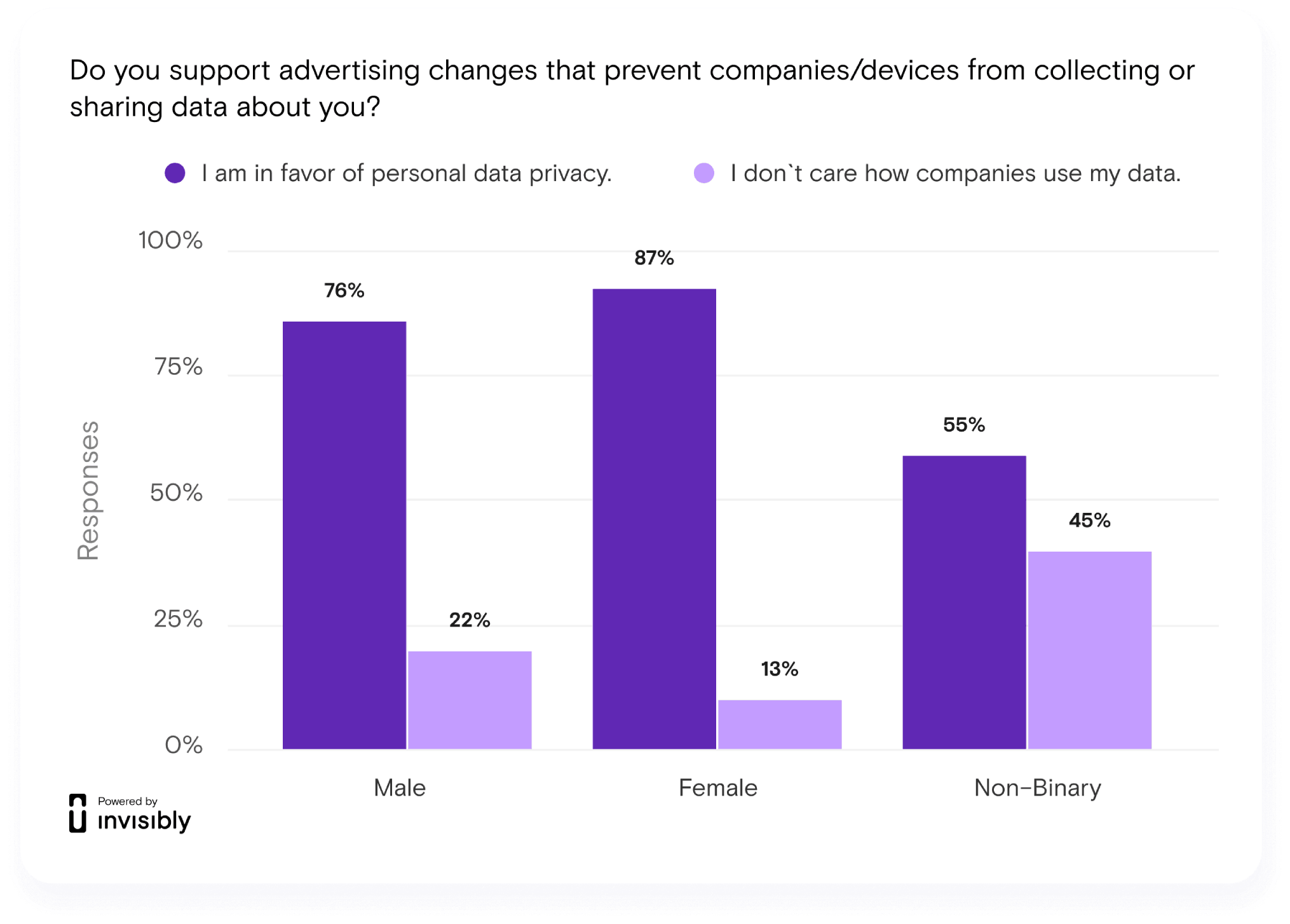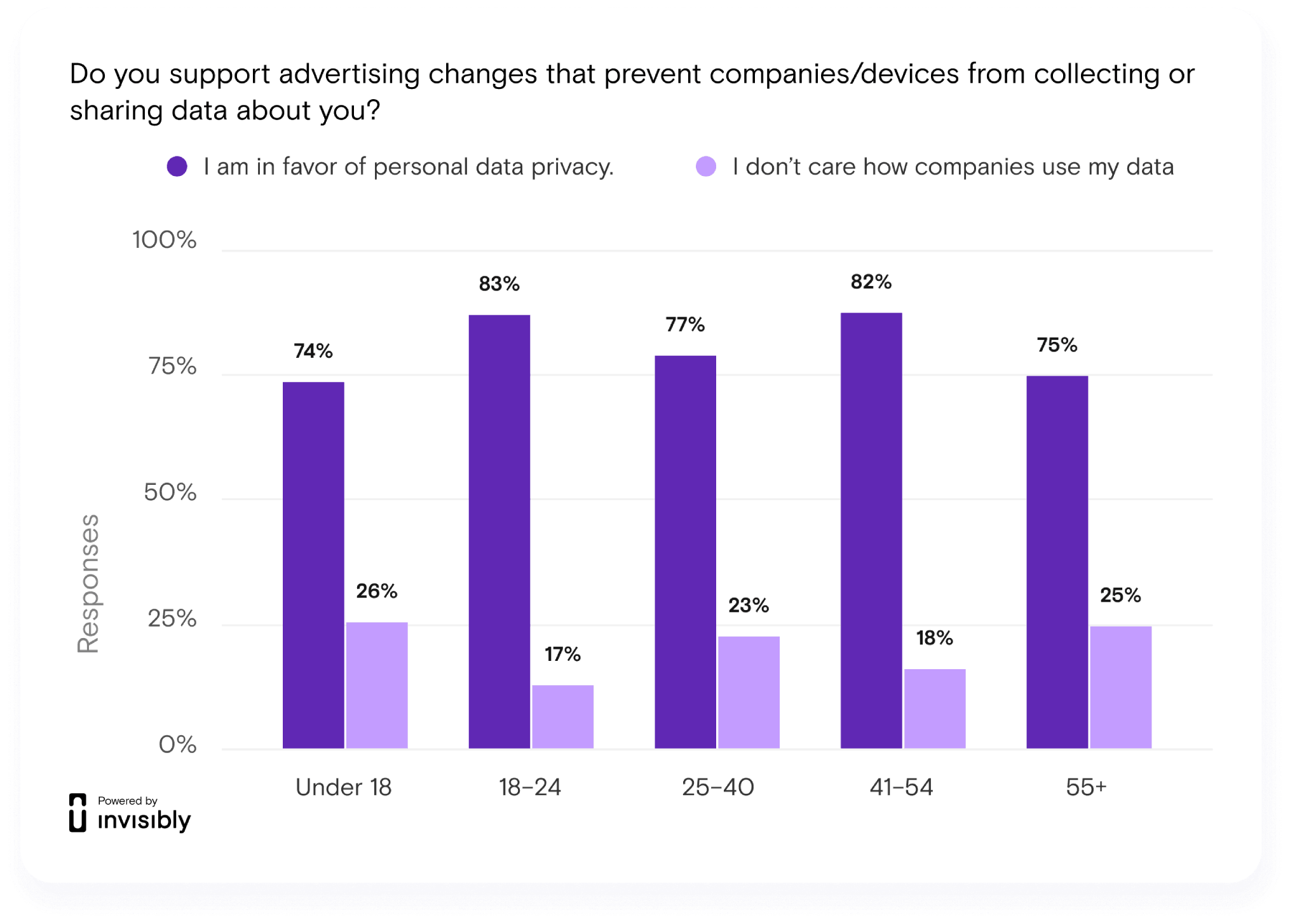As the internet continues to become intertwined with virtually everything that people need to end up doing on a day to day basis, a debate has started to stir that involves the use of the various types of data that these users might just end up generating. There has been a fair amount of concern surrounding the question of what companies end up acquiring your data, what data they manage to get their hands on as well as the kinds of ways in which this data might just be used.
A recent survey conducted by Invisibly has revealed some significant misgivings among the vast majority of users regarding the use of their data online. 1247 respondents were asked questions as part of this survey, and 8 in 10 of respondents (82% to be precise) said that they supported the concept of regulations put in place by various authorities to make it so that the amount of data that any major corporation would be capable of collecting would be severely limited.
68% of the people that took part in the survey said that their privacy online was something that mattered to them a great deal, and 76% said that they really didn’t like the idea of some kind of ad that they might be shown being the result of some form of targeting that was done with their particular preferences in mind based on the data that companies would have derived from them. There is a gender disparity at work here too since women tend to have more misgivings about targeted ads as 11% fewer women said that they wanted target ads in the first place.
If you divide the data up by age brackets, it turns out that the age group that has the most misgivings in this regard is the 41-54 demographic since 88% of the respondents that were between these two ages said that they did personal data protection was a major priority for them. Children under 18 tended to have fewer misgivings relatively speaking, with only 68% of them saying that this was a priority for them.
However, the fact that the respondents under 18 are not yet adults might make their preferences seem a lot less reliable since they might just end up changing once these respondents start to realize the impact of their data usage. The percentage of respondents between the ages of 18-40 and 55+ had similar levels of misgivings, with the number being 71% for both.
This is a major indication that online privacy has become a serious issue for the vast majority of users in the online space. This is being seen across various demographics as well as through the gender divide, and while there are certain differences when you break the data up based on specific aspects of the kind of respondents that were involved in this survey, it should be noted that for the most part this remains an issue regardless of what kind of identifiers people associate themselves with.
A rather unique aspect of this survey had to do with the responses that were received from individuals that do not conform to a gender and instead identify as non-binary. Non-binary respondents tended to be split down the middle in this survey which is different from what is seen among gendered respondents.
However, this might have more to do with the fact that fewer people who do not conform to a gender are incorporated into surveys and if a wider survey was conducted that included more members of this demographic then a trend that is more similar to what is being seen for male and female respondents might start to arise. This is something that might impact the decisions that tech companies end up making in the future.
Read next: Trading Your Privacy For Safety (infographics)
A recent survey conducted by Invisibly has revealed some significant misgivings among the vast majority of users regarding the use of their data online. 1247 respondents were asked questions as part of this survey, and 8 in 10 of respondents (82% to be precise) said that they supported the concept of regulations put in place by various authorities to make it so that the amount of data that any major corporation would be capable of collecting would be severely limited.
68% of the people that took part in the survey said that their privacy online was something that mattered to them a great deal, and 76% said that they really didn’t like the idea of some kind of ad that they might be shown being the result of some form of targeting that was done with their particular preferences in mind based on the data that companies would have derived from them. There is a gender disparity at work here too since women tend to have more misgivings about targeted ads as 11% fewer women said that they wanted target ads in the first place.
If you divide the data up by age brackets, it turns out that the age group that has the most misgivings in this regard is the 41-54 demographic since 88% of the respondents that were between these two ages said that they did personal data protection was a major priority for them. Children under 18 tended to have fewer misgivings relatively speaking, with only 68% of them saying that this was a priority for them.
However, the fact that the respondents under 18 are not yet adults might make their preferences seem a lot less reliable since they might just end up changing once these respondents start to realize the impact of their data usage. The percentage of respondents between the ages of 18-40 and 55+ had similar levels of misgivings, with the number being 71% for both.
This is a major indication that online privacy has become a serious issue for the vast majority of users in the online space. This is being seen across various demographics as well as through the gender divide, and while there are certain differences when you break the data up based on specific aspects of the kind of respondents that were involved in this survey, it should be noted that for the most part this remains an issue regardless of what kind of identifiers people associate themselves with.
A rather unique aspect of this survey had to do with the responses that were received from individuals that do not conform to a gender and instead identify as non-binary. Non-binary respondents tended to be split down the middle in this survey which is different from what is seen among gendered respondents.
However, this might have more to do with the fact that fewer people who do not conform to a gender are incorporated into surveys and if a wider survey was conducted that included more members of this demographic then a trend that is more similar to what is being seen for male and female respondents might start to arise. This is something that might impact the decisions that tech companies end up making in the future.
Read next: Trading Your Privacy For Safety (infographics)











